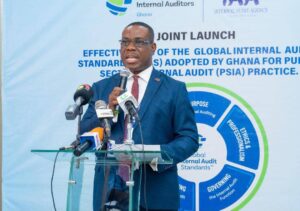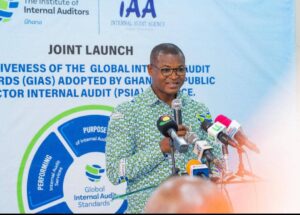By Juliet ETEFE ([email protected])
Ghana has officially begun implementing the Global Internal Audit Standards (GIAS).
GIAS aim to enhance public financial management (PFM), accountability and governance. The new standards for internal audit practice were released globally on January 9, 2024 and Ghana adopted them on February 22, 2024, making it one of the first countries to do so.
These standards, initially developed in the 2017 International Professional Practice Framework ( IPPF), consist of 52 standards put into five key domains and further divided into 15 guiding principles aimed at improving the quality of internal audit functions globally and providing a framework for evaluation.
To prepare for the January 9, 2025 implementation deadline, the Internal Audit Agency (IAA) of Ghana developed an implementation roadmap, oriented stakeholders and issued guidance for reviewing internal audit charters in public institutions by December 31, 2024.
After this launch, the IAA expects Public Sector Internal Audit Units to report on compliance with the standards in their first-quarter 2025 submissions by April 30.
These efforts, in collaboration with the Institute of Internal Auditors (IIA), aim to professionalise internal audit practice in Ghana and align it with global standards.
Commitment
Dr. Eric Osae, Director-General of the IAA, underscored the adoption’s significance, emphasising the standards’ transformative potential for strengthening financial governance and reducing corruption through preventive measures.

He noted that the standards will serve as a vital tool in government’s agenda to reset the economy and ensure value for money in public administration.
He also outlined the IAA’s mandate to regulate and guide internal audit practices across the public sector, emphasising the importance of aligning these practices with global benchmarks.
Dr. Osae also detailed several challenges faced by public sector internal auditors, including resource constraints, professional intimidation and delays in legislative amendments. However, he expressed optimism – citing significant strides such as transitioning to risk-based auditing, automating internal audit systems and introducing a performance audit framework.
Ghana’s unique needs
President of IIA Ghana, Joseph Dakora Zumasigee, highlighted the collaborative efforts between IIA Ghana and the IAA in shaping the standards to reflect Ghana’s unique needs while aligning with global requirements.

“The combined efforts of the IAA and IIA Ghana have placed the country in an enviable position within the global internal audit fraternity,” Mr. Zumasigee noted.
He urged senior management and board members of public institutions to support internal auditors in implementing the standards effectively.
He also called on regulators to ensure adherence to the standards, emphasising that they promise to enhance internal control environments, ethical conduct and organisational efficiency.
Professional excellence and global alignment
Past Chairman of the African Federation of Institutes of Internal Auditors (AFIIA) and former President of IIA Ghana, Eric Yankah, lauded the launch as a historic milestone, stating the standards’ necessity in an era defined by emerging risks and technological advancements.

“These standards are designed to provide internal auditors with the guidance to deliver assignments with high professional competence….This has contributed to the continuing need for internal auditors to be agile, extremely competent, skillful and, of course, readily available and poised to meet the exigencies of institutions they serve,” Mr. Yankah stated.
He called on institutional management to create enabling environments for internal auditors, stressing that the standards will eliminate doubts about their professionalism and enhance audit coverage.
Mr. Yankah also advocated legislative support to secure a Presidential Charter for IIA Ghana, which would formalise the Institute as a professional body and further empower internal auditors.










